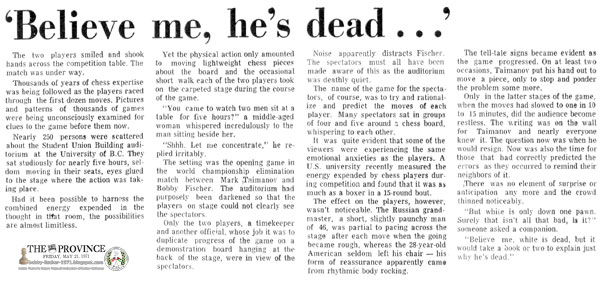The Province Vancouver, British Columbia, Canada Friday, May 21, 1971 - Page 47
‘Believe me, he's dead…’
The two players smiled and shook hands across the competition table. The match was under way.
Thousands of years of chess expertise was being followed as the players raced through the first dozen moves. Pictures and patterns of thousands of games were being unconsciously examined for clues to the the game before them now.
Nearly 250 persons were scattered about the Student Union Building auditorium at the University of B.C. They sat studiously for nearly five hours, seldom moving in their seats, eyes glued to the stage where the action was taking place.
Had it been possible to harness the combined energy expended in the thought in that room, the possibilities are almost limitless.
Yet the physical action only amounted to moving lightweight chess pieces about the board and the occasional short walk each of the two players took on the carpeted stage during the course of the game.
“You came to watch two men sit at a table for five hours?” a middle-aged woman whispered incredulously to the man sitting beside her.
“Shhh. Let me concentrate,” he replied irritably.
The setting was the opening game in the world championship elimination match between Mark Taimanov and Bobby Fischer. The auditorium had purposely been darkened so that the players on stage could not clearly see the spectators.
Only the two players, a timekeeper and another official, whose job it was to duplicate progress of the game on a demonstration board hanging at the back of the stage, were in view of the spectators.
Noise apparently distracts Fischer. The spectators must all have been made aware of this as the auditorium was deathly quiet.
The name of the game for the spectators, of course, was to try and rationalize and predict the moves of each player. Many spectators sat in groups of four and five around a chess board, whispering to each other.
It was quite evident that some of the viewers were experiencing the same emotional anxieties as the players. A U.S. university recently measured the energy expended by chess players during competition and found that it was as much as a boxer in a 15-round bout.
The effect on the players, however, wasn't noticeable. The Russian grandmaster, a short, slightly paunchy man of 46, was partial to pacing across the stage after each move when the going became rough, whereas the 28-year-old American seldom left his chair — his form of reassurance apparently came from rhythmic body rocking.
The tell-tale signs became evident as the game progressed. On at least two occasions, Taimanov put his hand out to move a piece, only to stop and ponder the problem some more.
Only in the latter stages of the game when the moves had slowed to one in 10 to 15 minutes, did the audience become restless. The writing was on the wall for Taimanov and nearly everyone knew it. The question now was when he would resign. Now was also the time for those that had correctly predicted the errors as they occurred to remind their neighbors of it.
There was no element of surprise or anticipation any more and the crowd thinned noticeably.
“But white is only down one pawn. Surely that isn't all that bad, is it?” someone asked a companion.
“Believe me, white is dead, but it would take a book or two to explain just why he's dead.”























